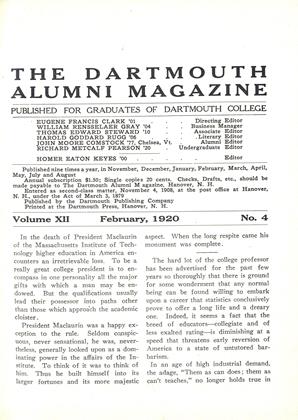Speaking on "Factors of Social Unrest" before members of the New Hampshire Constitutional Convention in Concord recently, an address in which he emphasized especially the role New Englanders may be expected to play in times as disturbed as the present, President E. M. Hopkins said that, "From such an environment (as northern New England) and from such a stock as ours in the northland country of this historic state, sanity and poise may most reasonably be expected at such a juncture. In present circumstances," he said, "the metaphorical analogy between mental view and physical sight is justified, and in the clear-visioned sweep of the eye of the northland Yankee from his New Hampshire hill-top, there may be that accuracy of perspective and judgment of proportion which is so woefully needed and so widely lacking throughout the country at large these days.—The will to do rightly is implanted within us, both by our lineage and by our desires. Our problem is to know what is, in the best sense, expedient. Only through the approximate accuracy of our knowledge at these points will the chronicles of the years to come be able to assert that we have done well.
"It seems to me obvious that we are not called upon to accept or to harbor professional agitators delegated to this country to preach sedition, violence, or overturn of the social order. However, I submit that the desirability of excluding or of ridding ourselves of these persons does not justify the extent to which we have gone in the matter of deportations nor in the number of arrests.
"We cannot as a nation forget the principles of the bill of rights, we cannot attempt to hold men guilty until they prove themselves innocent, we cannot assume a conspiracy to overthrow the government by force on the basis of the number of rifles and bombs found as a result of thousands of arrests. It is not necessery to wax sentimental over the muddled thinkers and irresponsible controversialists, to shrink from the ultimate consequences upon ourselves of such a policy as we have seen put into operation. Communism is not a creed, probably, that any of us here are tempted to espouse, and the less so since the particularly abhorrent demonstration of it given by the Bolsheviki of Russia.
"I wish to emphasize that the inevitable reaction of the war would have been a challenge to the absolutism of the old industrial code, because of the lessening of the ties which bind millions of men in industry.
"The problem challenges the best thinking of an intelligent age, for unless work can be made more interesting to men, unless they can feel themselves something more than incidental and wholly obscure agents in production, unless they can be brought to feel an incentive within themselves toward accomplishment, production can be secured solely by an almost endless series of shortening of hours and by increasing of wage."
 View Full Issue
View Full Issue
More From This Issue
-
 Article
ArticleTHE SPIRIT OF DARTMOUTH
February 1920 By Edwin Webster Sanborn '78 -
 Class Notes
Class NotesCLASS OF 1910
February 1920 By Whitney H. Eastman -
 Article
ArticleIn the death of President Maclaurin of the Massachusetts Institute of Technology
February 1920 -
 Article
ArticleTHE PLANS FOR MEMORIAL FIELD
February 1920 By James P. Richardson '99 -
 Books
BooksALUMNI PUBLICATIONS
February 1920 By F.P.E., C.E.B. -
 Article
ArticleRESUME OF TREASURER'S REPORT FOR 1918-19
February 1920
Article
-
 Article
ArticleCommencement is over. The college year is ended.
August, 1923 -
 Article
ArticleFund Contributors for 1946
January 1947 -
 Article
ArticleCanada's New "Mt. Dartmouth"
December 1959 -
 Article
ArticleMasthead
February 1962 -
 Article
ArticleSoccer
November 1955 By Cliff Jordan '45 -
 Article
ArticleAlbuquerque
MAY 1970 By RICHARD B. PAUL '41

